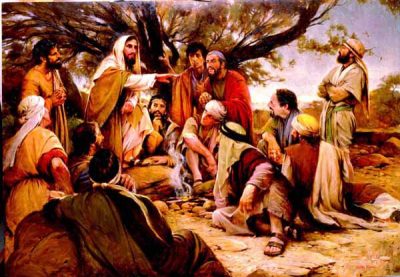Liturgical Readings for : Tuesday, 10th September, 2024
Tuesday of the Twenty Third Week in Ordinary Time, Year 2
Optional memorial of St Peter Claver , priest
FIRST READING
A reading from the first letter of St Paul to the Corinthians 6:1-11
There are differences between brothers in front of unbelievers.

How dare one of your members take up a complaint against another in the lawcourts of the unjust instead of before the saints? As you know, it is the saints who are to ‘judge the world’; and if the world is to be judged by you, how can you be unfit to judge trifling cases? Since we are also to judge angels, it follows that we can judge matters of everyday life; but when you have had cases of that kind, the people you appointed to try them were not even respected in the Church. You should be ashamed: is there really not one reliable man among you to settle differences between brothers and so one brother brings a court case against another in front of unbelievers? It is bad enough for you to have lawsuits at all against one another: oughtn’t you to let yourselves be wronged, and let yourselves be cheated? But you are doing the wronging and the cheating, and to your own brothers.
You know perfectly well that people who do wrong will not inherit the kingdom of God: people of immoral lives, idolaters, adulterers, catamites, sodomites, thieves, usurers, drunkards, slanderers and swindlers will never inherit the kingdom of God. These are the sort of people some of you were once, but now you have been washed clean, and sanctified, and justified through the name of the Lord Jesus Christ and through the Spirit of our God.
The Word of the Lord. Thanks be to God.
Responsorial Psalm Ps 149
Response The Lord takes delight in his people.
Or Alleluia!
1. Sing a new song to the Lord, his praise in the assembly of the faithful.
Let Israel rejoice in its Maker, let Zion’s sons exult in their king. Response
2. Let them praise his name with dancing and make music with timbrel and harp.
For the Lord takes delight in his people. He crowns the poor with salvation. Response
3. Let the faithful rejoice in their glory, shout for joy and take their rest.
Let the praise of God be on their lips: this honour is for all his faithful. Response
GOSPEL
The Lord be with you. And with your spirit
A reading from the holy Gospel according to Luke 6:12-19
Jesus spent the whole night in prayer to God and picked out twelve whom he called them ‘apostles.’

Jesus went out into the hills to pray; and he spent the whole night in prayer to God. When day came he summoned his disciples and picked out twelve of them;
he called them ‘Apostles‘:
Simon whom he called Peter, and his brother Andrew; James, John, Philip, Bartholomew, Matthew, Thomas, James son of Alphaeus, Simon called the Zealot, Judas son of James, and Judas Iscariot who became a traitor.
He then came down with them and stopped at a piece of level ground where there was a large gathering of his disciples with a great crowd of people from all parts of Judaea and from Jerusalem and from the coastal region of Tyre and Sidon who had come to hear him and to be cured of their diseases. People tormented by unclean spirits were also cured, and everyone in the crowd was trying to touch him because power came out of him that cured them all.
The Gospel of the Lord Praise to you, Lord Jesus Christ.
********************
Gospel Reflection Tuesday Twenty Third Week in Ordinary Time Luke 6:12-19
I was struck by the last line in today’s gospel reading, ‘everyone in the crowd was trying to touch him because power came out of him that cured them all’. People wanted to touch this man through whom God was working so powerfully. It wasn’t just enough to hear him or to see him; they needed to touch him. Touching the Lord is a more intimate, a more personal, form of communication with him than hearing or seeing. The sense of touch remains important in the faith life of us all.
We too want to touch the Lord, and to be touched by him. It is above all in and through the Sacraments that we touch the Lord and allow him to touch our lives. In the Eucharist, for example, we take the bread in our hands or on our tongue and eat it; we take the chalice in our hands and drink from it. The sense of touch is very real there. As we take the bread and take the cup, as we touch the Lord in this way, the Lord takes us; he touches our lives. Like the people in the gospel reading, we too can experience the healing and renewing power that comes from him. The Lord who touches us in the Eucharist sends us forth to touch the lives of others in life-giving ways.
________________________________
The Scripture Readings are taken from The Jerusalem Bible, published by Darton, Longman and Todd Ltd











